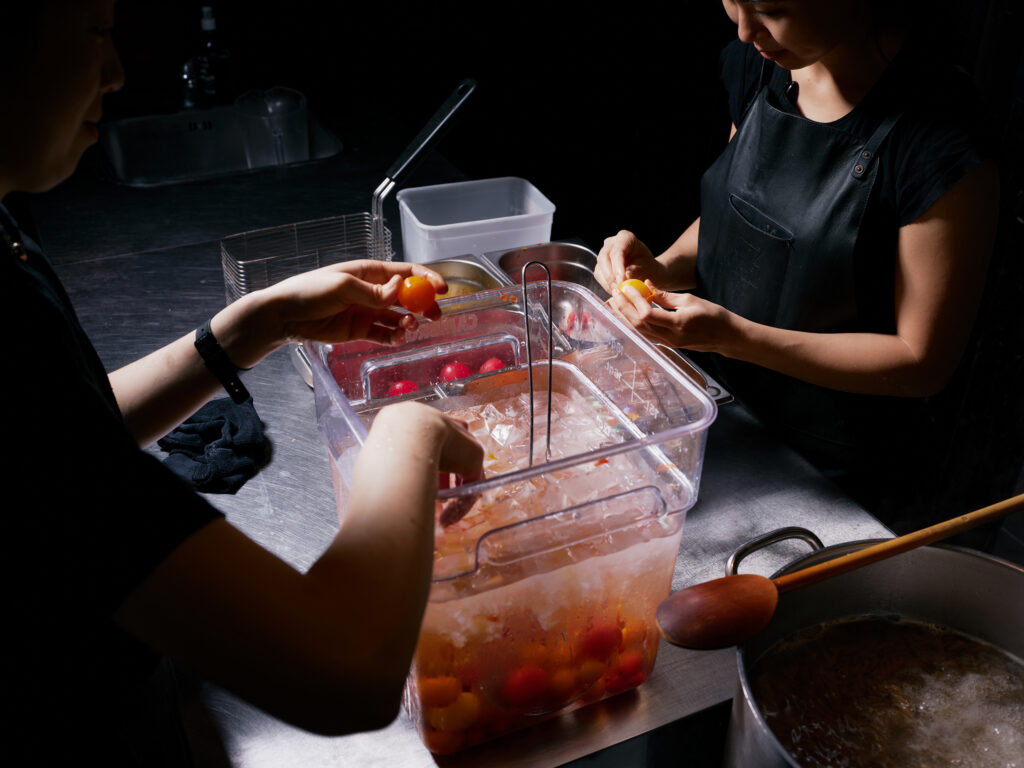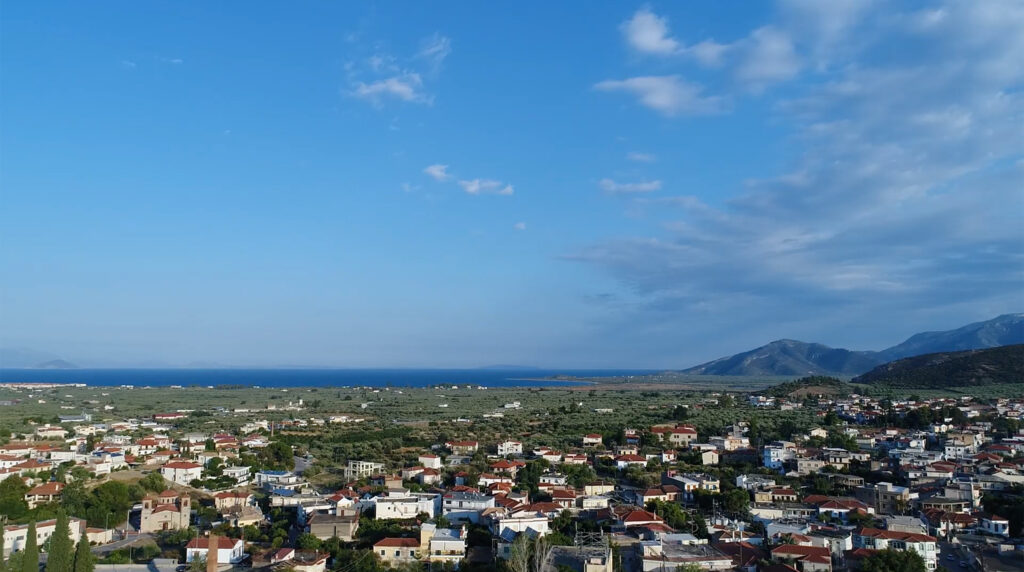
Field notes from Thyrea,
a Living Lab.
“First of all you encounter the sea, the land, olive orchards and mountains… and then you meet the people.”
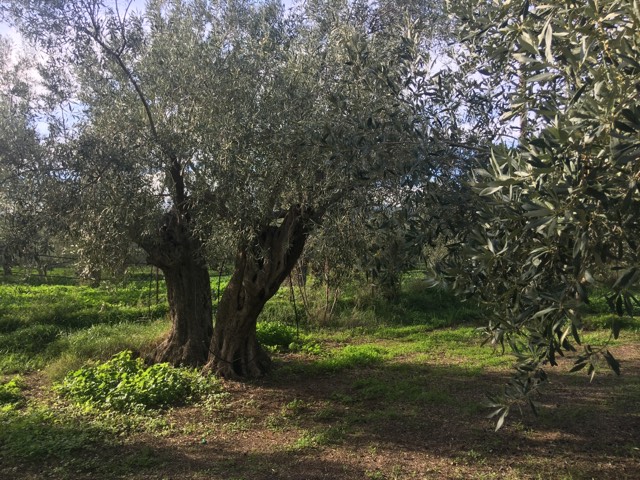
THE LONG ARC OF REGENERATION
Natsai Chieza: Christiana, tell me about what has inspired your journey so far into the work that you do.
Christiana Gardikioti: I was born in Greece and attended a French school, which opened my eyes to other cultures. At 17, I left the country for Canada to pursue my education. I graduated from theatre and fine arts schools at the University of Regina, Saskatchewan, Canada. I initially taught French and later studied at the Edwards School of Business (formerly the College of Commerce) at the University of Saskatchewan, where I majored in finance. This eventually led me to become a New York Stock Exchange trader at Merrill Lynch, where I got to see how things worked behind the scenes.
I left because curiosity was my primary motivator, returning to Greece when my parents became very sick. Unfortunately, at that time, the country had little to offer in terms of jobs or careers. There were no tools like Zoom or options for remote work—just a small fishing village and a summer resort from July to August, on the brink of decline. What do you do when your parents are ill and you need to be there?
One day, I looked at the nearby Mount Parnonas and had an ‘Aha’ moment: I realised I needed to do everything in my power to make the village productive again, but in a way that respects and protects nature. That was my defining moment, and I thought, ‘I’m going to create the first natural factory in the world!’ When I shared this vision, people said I came from a good family but that I was a bit out of my mind. Then, I discovered Dr Gunter Pauli, creator of the concept of The Blue Economy [t. - 1] , who was doing amazing work by connecting the microcosm to the macrocosm and creating value for local economies. He came to visit and introduced us in the village of Agiannis to the concept of the bioeconomy: the parts of the economy that use renewable biological resources from land and sea—such as crops, forests, fish, animals, and micro-organisms—to produce food, health products, materials, textiles, and energy. He inspired me to start with what I had, where I was, and make the most of it. We never talked about money—we simply said, ‘Let’s do it. Let’s engage. Let’s work.’ And that’s how we began.
Seven years later, I’ve established the foundations of a BioFabLab [t. - 2] , where I can engage youth and women with everything from microscopes to 3D printers. In 2024, we were awarded a Horizon (Soil Mission) grant [t. - 3] from the European Union to teach farmers about living soil. As a result, the rural area, known for producing olive oil, is becoming more aware of environmental stewardship, focusing on preserving the soil’s microbiome and improving farming practices. We also secured another program from the European Union in 2024 to start using olive branches, which were previously burned, as substrates for growing mushrooms. The concept of a cyclical economy has begun to take shape, and we now have the mandate to teach young people in the Balkans how to create livelihoods from this model. Last but not least, we’ve partnered with several universities, including the National and Kapodistrian University of Athens, Democritus University, and the University of Patras, to connect youth with rural areas and provide the scientific and technological knowledge needed to establish a ‘living lab’ and pursue bio-enterprising—creating businesses based on the bioeconomy.
This is my story. This is the way forward. What inspires me the most is my gratitude for everything I’ve been given and my humility in recognising the wisdom of nature.
Natsai Chieza: It does sound like your path has been an intuitive one, led by curiosity and a deep sense of self-knowing. We’ve met in person, and there’s something innate in your character and in your spirit that feels contingent on that. How long between these practices, from theatre to finance, before you knew that you were ready to move on and that it was ok to do so?
Christiana Gardikioti: Seven years. There’s something magical about seven years in my life. Seven years spent studying drama and landing my first job. Seven years working as a teacher, educator, and consultant. Seven years excelling in the finance field. And then, at the end of that—goodbye, Charlie. I’m going back to nature, back to the village, to rural life. So it’s been seven years. Seven years, then a break. Seven years, then a break. Seven years, then a break. It seems to be a pattern.
Natsai Chieza: That’s interesting. So, you pivot from finance, return home, and discover a wealth of biodiversity that was not matched, if you like, in the health of your community. What had changed since you left home?
Christiana Gardikioti: I looked around at my community and saw exponential destruction. All the youth were leaving. No one was staying because they had lost hope. They believed nothing would happen here and that their only option was to immigrate—to Athens, or even further, to London, Toronto, Brisbane, South Africa. Anywhere but here. This led to a terrible state of abandonment. The rural village life, with its farmers, shepherds, and primary industries, was dying. With that, the culture was dying too. When you went to the village coffee shop, the reality was stark: out of 100 high school graduates, 98 left. Only 2 stayed. Everyone aged 35 and over was saying the same thing: ‘We are doomed. Nothing happens here. It’s just good that we have tourism to keep us afloat for two months in the summer.
That reality made me determined to do something—for myself, and for my community. I was growing inside with all the learning I was doing. I didn’t know anything about microscopes or microorganisms. I knew nothing about bio-based industries. This was all a new language to me. But I felt the challenge to bring it to my community.
My community is made up of farmers, small and medium enterprise owners, women who desperately need income to support their families—especially single parents—and various cultural and artistic groups. Yet nobody wanted to get involved. They thought, ‘Nice idea, Christiana, but let’s stick to what we know.’ It was tough at first because they didn’t believe in the possibilities. But when they saw that there were people from the outside interested in helping, not taking advantage of them, that was when things started to shift. I was incredibly fortunate to have fantastic mentors, like Fyodor Ovchinnikov of Evolutionary Futures Lab [t. - 4] , whose focus was never on extraction or using the community. It was about helping them grow. And people felt that.
Then, of course, the turning point came when the European Union accepted us into the Horizon program to turn the area into a Living Lab—a cluster of dynamic spaces where ideas come to life through collaborative exploration and user-driven innovation. That was a game-changer. Once that happened, things started turning around.
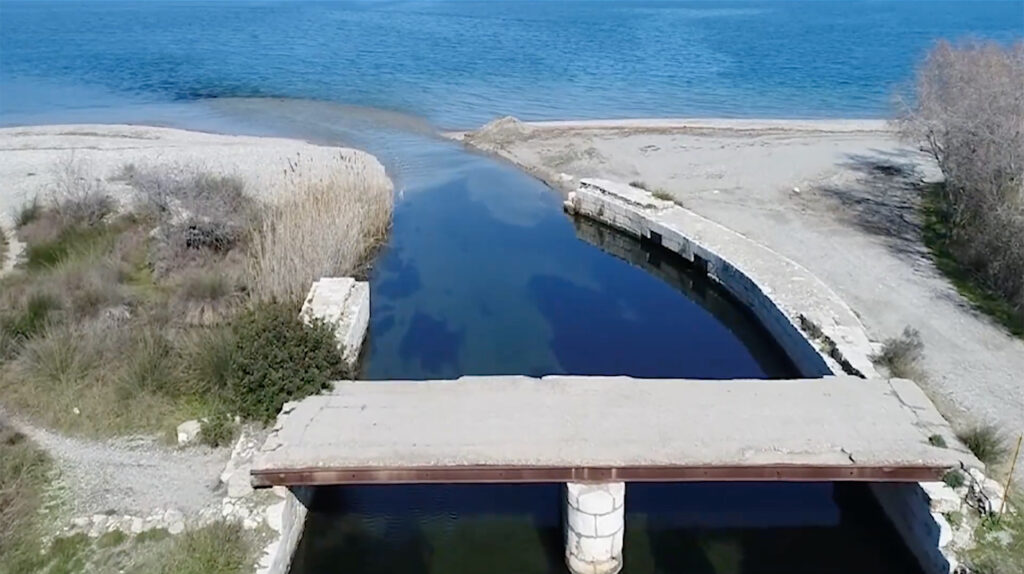
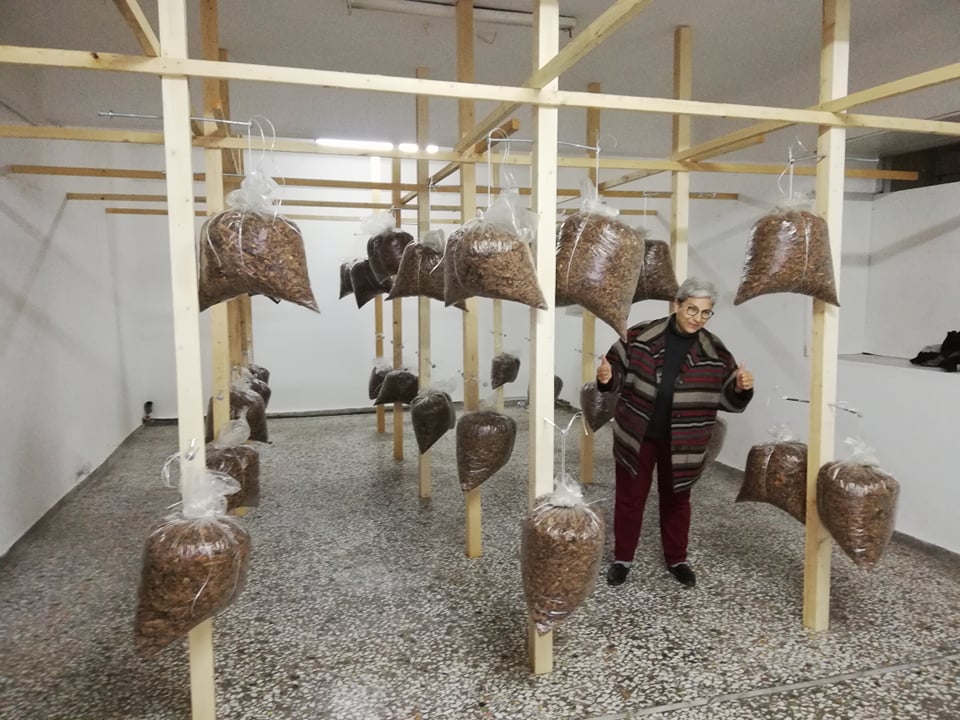
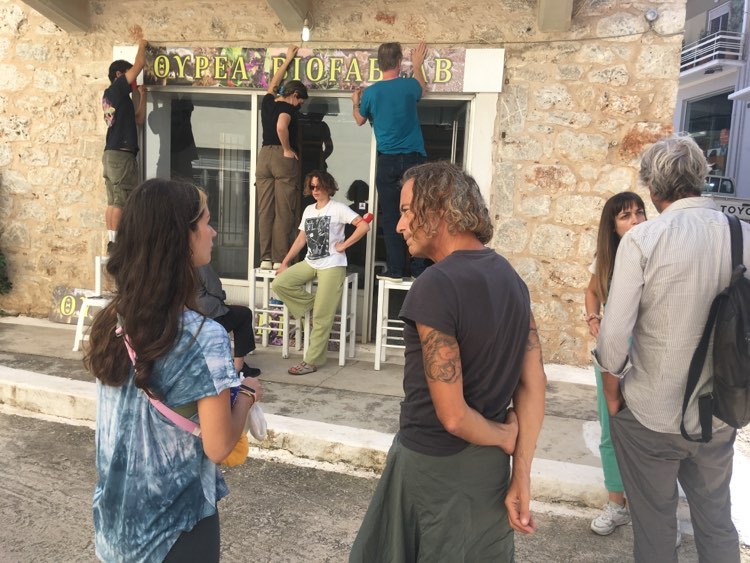
"So, in the midst of all adversity, in the midst of wars, in the midst of economic earthquakes, here is a small community that says, 'The heck with all this, let’s focus. Let’s do the next thing."
MASTERING THE UNKNOWN: BRINGING VISIONS TO LIFE
Natsai Chieza: I’m struck by something you said earlier about having this vision, a vision where you admit to yourself that you didn’t know much about it, yet have to sell to everybody. That, to me, is kind of incredible, and why I think your personality is so contagious. Because self-doubt is one of the biggest killers to seeing any kind of vision come to bear. Before you even say it out loud to other people, that belief in the thing that you want to realise is so fundamental. And so, I kind of want to delve a little bit deeper into what connections you were making at the time. What reinforced these ideas for you before you even came to the village and said, ‘Hear me out’? To be able to then sit with the kind of resistance that inevitably would follow after you said those things out loud, across the community—from the farmer to the politician, to everyone who has a stake in what happens there.
Christiana Gardikioti: You see, the answer always lies within you, not outside of you. So, when I was 17, my dad asked me: ‘What do you think you’re going to do for the rest of your life?’ I said, ‘Dad, I want to be a trader in the New York Stock Exchange.’ Now, that’s the seventies in a rural area in Greece, and being a woman. The old man looked at me, and he said, ‘Sorry, dear, wrong sex, wrong religion.’ Meaning, you cannot do it. And that inspired me. I thought, ‘No, no, no, no! Just one second. Yes, I am a woman, and yes, I am Greek Orthodox. Who says I cannot trade in the New York Stock Exchange?’ So, I gained all this resistance, because I did it. I came back successful at 39. Hello!
Now I am saying to a much larger frame: we need to change our way of thinking. We need to change the production model. We need to go into systems design and integrate nature as a core part of the economic model. We cannot just make shoes, sell shoes, and destroy the Earth. Wrong model. Come on, let’s do something! And I guess what gave me strength was the fact that I had been successful before, and I was very determined to go and seek help. ‘Hi! I’m Christiana. I know nothing, but I’m very interested. Would you be kind enough to help me? I can be of great assistance to you.’ It was like a magnet. People came from all over the world to help me. ‘What is it that you need help with?’ Well, blah, blah, blah.
So I found myself at MIT with a Global Community Bio Summit [t. - 5] along with 700 other people working in open and citizen science. And one of them was Greek. You create a new universe, you delve deeper into it, and then, it is my conviction that the only thing that you really need is a personal computer and an extra dose of curiosity, because you can go to platforms like TEDx, and you can find people like yourself that are giving talks. If you go seek and if you tell them also, ‘Excuse me, I really need a little bit of help. Can you help me?’, 95% of the time people would be helping you, because they see your mission, they see your authenticity. They do not see a shark moving in wanting to have one million or one trillion. They see a person that says, ‘I want to grow. I want to bring my community somewhere, and if I can engage a small team of individuals, we can change the world. Would you like to help me?’ Chances are that people are going to say, ‘Of course we would like to help you, but you need to work.’ For which I never said no. I’m working diligently and a lot of times failing. But it’s from the failures that I get experience to go further. And it is the people that I meet, and their wealth and their perspective, that are helping us all, me and the community, to grow. And people understand that others care about them. And they care, and if they do stuff, they may have hope for a better future.
So, in the midst of all adversity, in the midst of wars, in the midst of economic earthquakes, here is a small community that says, ‘The heck with all this, let’s focus. Let’s do the next thing.’ So it’s kind of nice.
"In the finance world, this is very much prompt to: ‘We want money here, now. What's the profit?’ And I'm going: ‘The profit is that we are going to have a new forest."
GROWING FROM THE GROUND UP IN ASTROS
Natsai Chieza: Science, technology and social studies are well studied by social scientists yet still have limited influence in technology development or deployment. It is therefore very interesting to hear about how you have taken this promise of a bioeconomy that leverages technology to your community. There’s a bottom-up approach that only feels possible because of your belonging there. What was your opening gambit?
Christiana Gardikioti: It was an email, a simple email that changed my life. I found Dr Gunter Pauli, and I searched, and I saw that he worked for Novamont, a bio-based industry, and he had accomplished a great deal of projects: 200 projects already done in the universe. Wow! So here is my question to him: ‘Sir, if you have 200 projects done, if you have raised so many billions in financing, and if you have created one million jobs, why can you not help my village?’ This was the email.
Natsai Chieza: I love it!
Christiana Gardikioti: ‘I’m coming to help you.’ That’s how it started. My country had entered capital controls, which is when the government gets into your bank account, and you can only have access to at that time, 50 euros per week. This was a major challenge—we’re talking about the worst crisis Greece had faced since World War II. And here I am, saying, ‘We’re going to invite someone to talk to us about bio-based industries.’ People must have thought, ‘How deranged can you be?’ Everyone in the village square told me, ‘Christiana, do something else. You’re a good person.’ But I said, ‘Yeah, as a matter of fact, I’m going to go ahead with my idea.’
And so, we had 68 people join us from 14 countries, and 35 of them were from the local area. That’s when Dr Gunter Pauli taught us about systems design, regenerative thinking, and how to start with what we had. We began with olive branches, turning them into a substrate for mushrooms, and from there, we started asking: Could we research fungi? Could we make fungi bricks, fungi leather, or even fungi packaging? These were the kinds of questions we began exploring. It was just a small group of people, but we were excited. We then visited other communities where similar initiatives were being done and learned from their experiences, and that’s how we got started.
Natsai Chieza: So you reached out to him, and did he bring these people who are external or?
Christiana Gardikioti: No, no, no! I was the one who convened everyone. He was travelling from South Africa to Milan or Torino, but he stopped over in Athens. He was invited to a small village, and when he arrived, he found 68 people already gathered there. He was amazed. We had a fantastic weekend, and that’s how it all began.
His advice was clear: ‘You can’t go anywhere unless you bring academics with you.’ He emphasised that we must go hand-in-hand with knowledge, but in a different setting and with a different governance model. We’re not a big corporation paying for research; we are a new community trying to foster yeast-like growth. So, we found our first three professors who were willing to work with us. Now, we don’t just have three professors—we have at least fifteen. This has made a huge difference, as people now trust that if we get funding, we’ll use it wisely, no matter how little that funding may be. And I need to tell you that for the past seven years that we have been in operation, we did it with no external financing. We did enough to have oxygen to survive the valley of death, and now we are shaping up, and changing a society. It is not like we made the shoes and we sold them. Changing a society needs at least 15 to 20 years. And there are not many people out there, who are willing to go through the trouble of making this lengthy change. In the finance world, this is very much prompt to: ‘We want money here, now. What’s the profit?’ And I’m going: ‘The profit is that we are going to have a new forest.’ We are changing a frame of mind, and investors need to understand not only the superficial things of the past, that is, how much profit they will make, and how wealthy they can become. Because the answer lies with the fires in LA. Even if you had a 12 million dollar villa, if nature is after you, you have nothing. So at the table, there’s profit, but there’s also nature. And then there’s also societies, and we are all happy. I am not against profit, not at all, but the framework needs to change.
Natsai Chieza: We need balance.
Christiana Gardikioti: And to scale it up. If we are going to create value, we need to be creative and resourceful enough to scale it. But that needs a laboratory, which means a little bit of license to fail. We cannot just go and say, ‘This is going to work and it’s bulletproof.’ That’s big bullshit. Pardon my French, but this is the wrong attitude, and it has not led us to the right path.
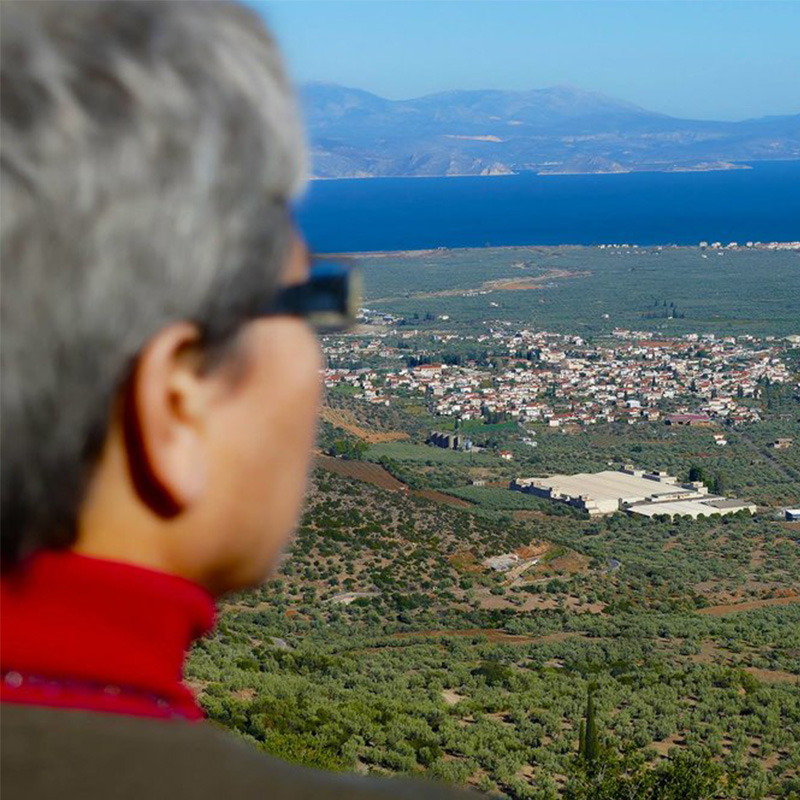
"And isn't it worth mentioning that women in this region still use the same type of loom Penelope used while waiting for Ulysses to return? There are other looms, but ours is different. Is it a mere coincidence that we have an olive tree that was already producing olives when Homer recited The Odyssey?
What I’m trying to say is that the most valuable resource we have is the who—the people and their ancient knowledge, which has served them well."
TENDING TO SOIL, PEOPLE AND PLACE
Natsai Chieza: So tell me about how you think about a bioregion. What needs to be true for this vision to be realised?
Christiana Gardikioti: I have two answers, and I will tackle them in the following order. First of all, you need every participant—policymakers, small and medium enterprise owners, investors, youth, women, and leaders—to understand one thing: the health of the soil touches the health of your gut, and then that translates into planetary health. How difficult is that thought? It’s one sentence. If they get it, wow! Now, getting there is difficult. Okay, granted. But this is the equation that everybody needs to understand: soil, human gut, planet. Then, translate it into economic wealth by making products that add value while respecting Nature! So you see, this is our Meraki. Here is where it all begins. You start with the roots, you go to the trunk, and then you go to the whole globe. And that looks like one person. And that’s our symbol.
Secondly, once they understand this equation, let’s have a place where we can gather once a week to engage in co-creation, co-design, co-decision-making, and co-working. The ‘co-‘ is first, because up to now, we had places where everybody was doing things on their own. So let’s create a place, where every Wednesday at 7 pm we engage in what we call ‘fertile dialogues’ that lead to action. So every time we have a dialogue, we decide what is to be done, by when, and how. This is a policy-making model that links the soil to people and brings together multidisciplinary professionals who interact with locals. It is easier said than done, but if you try, it works. But it takes time. You cannot push a button and achieve an immediate change. It’s not like instant coffee. We’re talking about building trust, meeting the financial needs, and the needs of people, youth dreams, and continuous learning. They’re not buttons that you push and you get a transformation immediately. Rome was not built in one day either!
Natsai Chieza: There’s this techno-utopian notion that we just need the technology, and then we’re just going to put it somewhere. And then that’s your new industrial strategy sorted out. Or that’s your bioregion for the bioeconomy sorted out. But what you’re saying is, you have to tend to the soil. You have to tend to the people, who are also the soil, right? Without the society at the centre having the agency to determine what happens with the land they know—as you mentioned about the man, the only one who knows his way up the mountain, and I’d love for you to talk about that—without this laser-sharp focus on building from the ground up, it doesn’t matter what you try to impose there. You’ll always end up asking the same questions: what’s valuable? Profit, profit, profit. Did the infrastructure we invested in, that capital, translate within the expected timeframe?
Christiana Gardikioti: You see, my region is officially called the prefecture of Northern Kynouria, but the locals call it Thyrea. In ancient Greek, it means ‘doorway.’ Three thousand years ago, the Spartans marched to Athens to conquer, and vice versa—the Athenians came to Sparta to wage war. The passageway for both was my region. It was the door, the gateway.
Now, the old way is fading, and a new way is emerging. We are Thyrea, the doorway to the future. Suddenly, people are saying, ‘Oh, we can use the palace of Herodes Atticus, where Roman soldiers, generals, and strategists once gathered to plan their conquests.’ And I say, ‘That’s it! You’re doing the same thing now—just repeating what your DNA is telling you.’ And isn’t it worth mentioning that women in this region still use the same type of loom Penelope used while waiting for Ulysses to return? There are other looms, but ours is different. Is it a mere coincidence that we have an olive tree that was already producing olives when Homer recited The Odyssey?
What I’m trying to say is that the most valuable resource we have is the who—the people and their ancient knowledge, which has served them well. But it’s being dismissed. People take the knowledge but go straight to academics instead. What we need is collaboration: academics working with us to make this knowledge relevant for today. We need them, and they need us. If we can agree on this partnership, we can go so much further. That’s the big mindset shift. And that’s why we created a new organisation—an NGO called STEAMers. That stands for Science, Technology, Engineering, Environmental Agriculture, Arts, and Mathematics. Because if you can’t quantify something, you have nothing. These STEAMers experiment with fertile dialogues, turning them into meaningful projects.
You see, focusing on a single discipline is wrong. It has to be multidisciplinary—with people at the centre—yet rich with knowledge and innovation. The shepherd is just as important as the doctor with a PhD and 550 publications. They are equals because the shepherd knows the healing properties of every little plant he encounters while tending his sheep and goats. He knows how to preserve olives, understands the yeast economy, and has been making wine for 3,000 years. He doesn’t need someone to teach him what he’s already practised for millennia. It’s intricate, like an orchestra. An orchestra is a miracle, where the conductor uses every musician equally to create music. You can’t say, ‘The violins are important, but the flute in the second or third row is less so.’ No—everyone in the orchestra plays a vital role in creating harmony. So this is what we are trying to do.
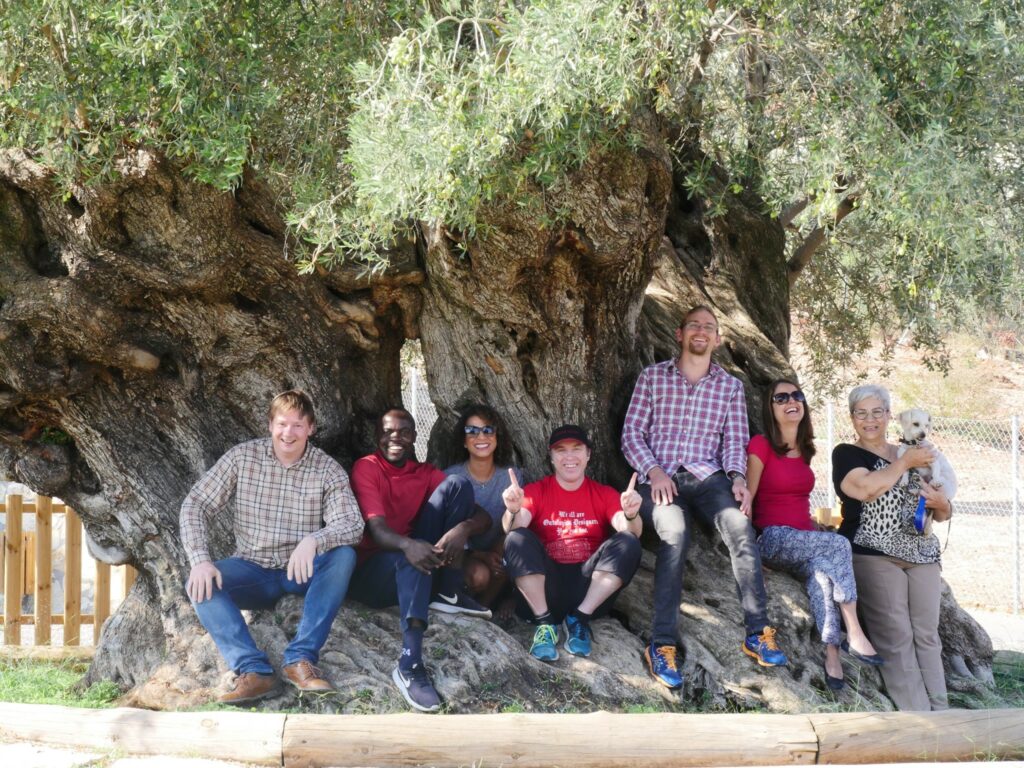
THE NEXT SEVEN
Natsai Chieza: So when I come to visit you, Christiana, what do I find?
Christiana Gardikioti: First of all, you encounter a physical environment of supreme beauty—the sea, the land, olive orchards, and mountains all within a small area. It’s a place where you can experience all seasons in one compact region. Then you meet the people, and that’s when you need to delve deeper into their culture. So you need someone like me who knows the locals and can guide you to the points of interest that matter to you—because your interests might be different from your friend’s. So you search for the right people, and then you come to the BioFabLab and say, ‘I’d like to start talking with your professors and scientists.’ But mind you, this isn’t some sophisticated, industrialised, state-of-the-art FabLab. It’s hands-on, rural, yet deeply curious. So this is what you’re going to discover. And when your trip is over, you’ll tell me what you saw through your own eyes, because each person’s story is very different from the general description of what you might expect to find in Thyra.
Natsai Chieza: What I find striking about Dr Gunter Pauli and the theory of change he presents is that if you’re not curious and hold on to preconceived notions, you’ll have a limited sense of what is valuable. You’ve got to step into a space and be willing to put the playbook down, be guided by radical curiosity—a practice in of itself—for the equation to change. But this can be difficult to sustain. What advice do you have for those who are pursuing the kind of systemic change that you’re enacting? How do they stay the course when facing resistance—especially at a time when very norms that served as a northstar for all of humankind are being upended? And, as Donna Haraway [t. - 6] puts it, for those wanting to ‘stay with the trouble’—how do they do so while having a 20-year horizon in mind? How can they commit to this practice, knowing that the change is slow and the resistance is fierce?
Christiana Gardikioti: Never lose faith. If you lose your faith, you lose it all—whether it’s for one minute or one hundred years. So never lose faith. Believe in what you’re doing.
Number two: Never give up, because the answer is out there. It’s just that you can’t see it right now. The answer is there.
Number three: If it fills your heart, you’re on the right path. It doesn’t matter if it makes you money. If it fills your heart, that’s what matters. If I go to bed tonight and wake up the next morning thinking, ‘I’ve got things to do, I need to figure out how to make this little packaging,’ and wondering where I can find the information or who will help me, that’s the kind of endless searching you need. Be curious. Never say, ‘I’ve found the answer.’ Because when you think you’ve found it, you haven’t found anything yet.
And last but not least: Believe you’re in kindergarten. Bring yourself back to that place. Don’t you remember that deep need to hold hands, feel secure, and yet play? Do it. It’s okay, no matter how old you are—65, or any age. Hold hands, be with each other, and never stop having fun and curiosity at play.
These are my, let’s say, prompts to everybody bold enough to go where no one has gone before.
Natsai Chieza: I love that—it’s such generous and timely advice. What’s next for you? What do you want the world to know about the next seven years?
Christiana Gardikioti: We have signed papers with the European Union, to have a sign that reads: ‘Thyrea, Living Lab—a place of innovation and research.’ This is my dream. Just one little sign that says, ‘This region is a place where you can come, create, experiment, and do things differently.’ We are a living lab.
Imagine you’re the Wright brothers. It’s the first time you’ve ever invented and flown a bird that is called an aeroplane, and it only stays in the air for two and a half minutes. A hundred years later, there’s an entire industry full of flying machines. How courageous were they in that first experiment? They knew nothing about the size, scope, or depth of their endeavor. But you have to feel like the Wright brothers. We need to hold hands and move forward together, courageously. Everybody’s welcome to join.
